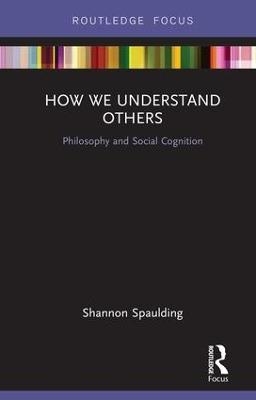
How We Understand Others
Philosophy and Social Cognition
Seiten
2018
Routledge (Verlag)
978-1-138-22158-1 (ISBN)
Routledge (Verlag)
978-1-138-22158-1 (ISBN)
In our everyday social interactions, we try to make sense of what people are thinking, why they act as they do, and what they are likely to do next. This process is called mindreading. Mindreading, Shannon Spaulding argues in this book, is central to our ability to understand and interact with others. Philosophers and cognitive scientists have converged on the idea that mindreading involves theorizing about and simulating others’ mental states. She argues that this view of mindreading is limiting and outdated. Most contemporary views of mindreading vastly underrepresent the diversity and complexity of mindreading. She articulates a new theory of mindreading that takes into account cutting edge philosophical and empirical research on in-group/out-group dynamics, social biases, and how our goals and the situational context influence how we interpret others’ behavior.
Spaulding's resulting theory of mindreading provides a more accurate, comprehensive, and perhaps pessimistic view of our abilities to understand others, with important epistemological and ethical implications. Deciding who is trustworthy, knowledgeable, and competent are epistemically and ethically fraught judgments: her new theory of mindreading sheds light on how these judgments are made and the conditions under which they are unreliable.
This book will be of great interest to students of philosophy of psychology, philosophy of mind, applied epistemology, cognitive science and moral psychology, as well as those interested in conceptual issues in psychology.
Spaulding's resulting theory of mindreading provides a more accurate, comprehensive, and perhaps pessimistic view of our abilities to understand others, with important epistemological and ethical implications. Deciding who is trustworthy, knowledgeable, and competent are epistemically and ethically fraught judgments: her new theory of mindreading sheds light on how these judgments are made and the conditions under which they are unreliable.
This book will be of great interest to students of philosophy of psychology, philosophy of mind, applied epistemology, cognitive science and moral psychology, as well as those interested in conceptual issues in psychology.
Shannon Spaulding is Assistant Professor of Philosophy at Oklahoma State University, USA.
1. Introduction 2. In Defense of Mindreading 3. Expanding the Scope of Mindreading 4. The Goals of Mindreading 5. Model Theory 6. Epistemic and Ethical Applications 7. Concluding Thoughts Index
| Erscheinungsdatum | 28.07.2018 |
|---|---|
| Reihe/Serie | Routledge Focus on Philosophy |
| Zusatzinfo | 3 Tables, black and white |
| Verlagsort | London |
| Sprache | englisch |
| Maße | 138 x 216 mm |
| Gewicht | 250 g |
| Themenwelt | Geisteswissenschaften ► Philosophie ► Erkenntnistheorie / Wissenschaftstheorie |
| Geisteswissenschaften ► Philosophie ► Ethik | |
| Geisteswissenschaften ► Psychologie ► Allgemeine Psychologie | |
| Geisteswissenschaften ► Psychologie ► Verhaltenstherapie | |
| ISBN-10 | 1-138-22158-9 / 1138221589 |
| ISBN-13 | 978-1-138-22158-1 / 9781138221581 |
| Zustand | Neuware |
| Haben Sie eine Frage zum Produkt? |
Mehr entdecken
aus dem Bereich
aus dem Bereich
die Grundlegung der modernen Philosophie
Buch | Softcover (2023)
C.H.Beck (Verlag)
CHF 25,20
Buch | Softcover (2023)
Reclam, Philipp (Verlag)
CHF 9,80

![Was heißt Denken?. Vorlesung Wintersemester 1951/52. [Was bedeutet das alles?] - Martin Heidegger](/media/113619842)
